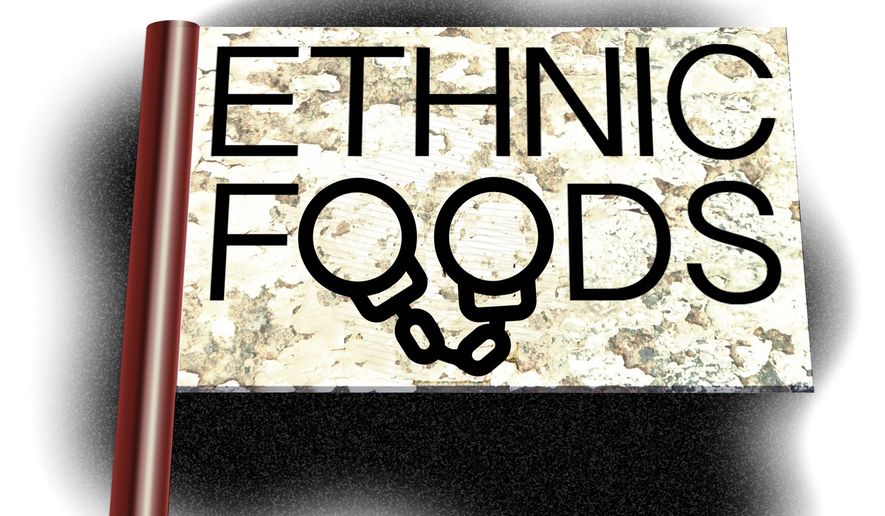OPINION:
Let’s take a break from the media’s Trump Derangement Syndrome and look at their other obsession — branding America as a uniquely racist nation.
America’s history of slavery and institutional racism can never be forgiven, we’re told, no matter how much healing and reconciliation take place. The wounds are opened and salted regularly.
In the “Lord of the Rings” trilogy, the evil lord Sauron sweeps the world with a beam from his flaming eye, looking for the ring of power and its carrier, Frodo. Back and forth it goes, relentlessly searching for its prey.
Likewise, the left’s Beam o’ Racism sweeps over the nation, searching for a camera-ready example. Those caught in its ray are quickly made into examples.
Carson King, an Iowa sports fan, jokingly tweeted for beer money in September. It went viral and he wound up donating $1 million to a children’s hospital. But a Des Moines Register reporter dug up racist tweets from Mr. King when he was 16. Although Mr. King said he was appalled by his tweets from 2012 and apologized, the controversy killed the golden goose for the sick kids. The reporter himself then admitted deleting his own racist tweets and was fired.
Even The Washington Post’s Food section this past week deployed the Beam o’ Racism. The front-page story was headlined: “Are ’ethnic’ food aisles racist?”
That’s right. The ethnic food aisles of Safeway, Kroger, Harris Teeter and Giant are dark reminders of America’s unique evil.
Washington Post restaurant critic Tim Carman wrote the piece, inspired by a podcast from David Chang, “the chef and restaurateur at the helm of the Momofuku empire.” Momofuku operates 14 restaurants in North America.
Mr. Chang calls ethnic food aisles “the last bastion of racism that you can see in full daylight in retail America.” Lamenting the plight of “children of immigrants,” Mr. Carman says that visiting their local supermarket is a ticket to trauma.
“The sting occurs whenever they walk down the ’ethnic’ food aisle, the section of the supermarket that, to some, plays out like a remnant of the Jim Crow era, when laws established separate facilities for African Americans in the post-Reconstruction South,” Mr. Carman writes.
Jim Crow was the work of Democrats, by the way. They resisted the passage of Republican-sponsored civil rights legislation even during the Eisenhower era and still promote abortion clinics in black communities. The party of the KKK was finally beaten in 1964, when a larger percentage of Republicans than Democrats voted for the Civil Rights Act and in 1965 for the Voting Rights Act.
For a detailed account, see “The Truth about Jim Crow” published by the American Civil Rights Union. Mr. Carman goes on, targeting the “Asian” and “Latino” food aisles, which constitute “de facto segregation, another kind of ’separate but equal’ policy that marginalized African Americans for generations.”
Maybe he and Mr. Chang are right. Maybe placing cans of refried beans next to taco shells really is racist, regardless of how handy it is for shoppers who like Mexican food. Maybe the nativist supermarket clerks smirk with delight as they malevolently place chop suey next to soy sauce.
Mr. Carman further quotes Mr. Chang, who opines that ethnic food aisles are a reminder of “1950s America, which was not a particularly good place to be, especially if you were Asian.”
Now we’re getting to it. The left has been recasting the story of America as 400 years of oppression, nothing else.
The left especially hates the 1950s. That’s when America was strong after winning World War II and when TV’s “Father Knows Best,” “Ozzie and Harriet” and “Leave It to Beaver” projected prosperity, vibrant families and healthy normalcy. It did take a few more years before Jim Crow was defeated, and black and Hispanic families had their own shows, and later, Asians.
But the biggest rub was not so much all-white casts but rather the shows’ emphasis on intact families, and clear distinctions between right and wrong.
For the past couple of decades, between superhero blockbusters, Hollywood has been churning out movies that focus on evil, featuring a villain at the center. Current examples include “The Joker” and “Maleficent: Mistress of Evil.” Even the 2008 Christopher Nolan epic “The Dark Knight” was more about Heath Ledger’s uber-evil Joker than Christian Bale’s Batman.
Shakespeare had memorable villains, and Blaise Pascal wrote that the best way to understand evil is to stare it in the face. But a steady diet of this cannot be good for the soul.
In any case, Hollywood seems to have a blind spot when it comes to evil. They’ve made many films about the Nazis, but Tinseltown has virtually ignored the greatest mass murder cult in history — communism.
Getting back to Mr. Chang’s complaint about the plight of Asians in 1950s America, we might want to remember that Chairman Mao’s Communist China at that time was slaughtering its people by the tens of millions.
But at least they were spared the horrors of America’s ethnic food aisles.
• Robert Knight is a contributor to The Washington Times.




Please read our comment policy before commenting.